- Home
- Brandon Sanderson
The Rithmatist Page 12
The Rithmatist Read online
Page 12
“And?” Melody replied. “They often hire new professors before summer elective starts.”
“He’s suspicious,” Joel said. “If he was such a great hero back at the battlefront, then why did he come here? Why take a low-level tutor position? Something’s going on with that man.”
“Joel,” she said. “You’re not honestly implying that Nalizar is behind the disappearances?”
“I don’t know,” Joel said as they reached the library. “I just want to know what books he’s looking at. I’m hoping Ms. Torrent lets me use a student for an escort.”
“Well, all right,” Melody said. “But I’m only doing this because I get to take a peek at Nalizar.”
“Melody,” Joel said. “He’s not a good person.”
“I never said anything about his morality, Joel,” she said, opening the door. “Only his face.” She swished into the room, and he followed. Ms. Torrent looked up as they passed her desk.
“He,” Melody said, pointing dramatically at Joel, “is mine. I need someone to carry books for me.”
Ms. Torrent looked like she wanted to protest, but—thankfully—she decided not to do so. Joel hurried after Melody, but stopped in the doorway to the Rithmatic wing.
He’d spent years trying to find a way to get into this room. He’d asked Rithmatic students before to bring him in, but nobody had been willing. Nalizar wasn’t the only one who was stingy with Rithmatic secrets. There was an air of exclusion to the entire order. They had their own table at dinner. They expressed hostility toward non-Rithmatic scholars. They had their own wing of the library, containing all the best texts on Rithmatics.
Joel took a deep breath, following Melody—who had turned toward him and was tapping her foot with an annoyed expression. Joel ignored her, reveling. The room even felt different from the ordinary library wing. The shelves were taller, the books older. The walls contained numerous charts and diagrams.
Joel stopped beside one that detailed the Taylor Defense—one of the most complicated, and controversial, Rithmatic defenses. He’d only ever seen small, vague sketches of it. Here, however, its various pieces were dissected and explained in great detail, along with several variations drawn smaller to the sides.
“Joel,” Melody snapped. “I didn’t abandon half my breakfast so you could stare at pictures. Honestly.”
He reluctantly turned his attention to their task. The bookshelves here were high enough that Nalizar wouldn’t be able to see Joel or Melody enter the room—which was good. Joel hated to contemplate the ruckus Nalizar would cause if he caught a non-Rithmatist poking around these texts.
Joel waved to Melody, quickly moving down the rows. They seemed placed more haphazardly than back in the main wing, though the library wasn’t really that big. He should be able to find—
Joel froze midstep as he walked past an aisle between shelves. There was Nalizar, not five feet from where Joel stood.
Melody pulled Joel aside, out of Nalizar’s line of sight. He stifled a grunt and joined her in the next row. They could peek through a crack between bookshelves and catch a glimpse of Nalizar, though the poor view didn’t let Joel read the title of the book the professor had.
Nalizar glanced up toward where Joel had been. Then he turned—never noticing Joel and Melody peering through the small slit at him—and walked away.
“What books are shelved there?” Joel whispered to Melody.
She rounded the other side—it wouldn’t matter if Nalizar saw her—and took one off the shelf. She wrinkled her nose and held the book up toward the crack for Joel. Theoretical Postulations on Developmental Rithmatics, Revised Edition, with a Foreword by Attin Balazmed.
“Dry stuff,” she said.
Theoretical Rithmatics, Joel thought. “I need to know the exact books Nalizar is carrying!”
Melody rolled her eyes. “Wait here,” she said, then walked off.
Joel waited nervously. Other Rithmatic students poked about. Those who saw him gave him odd looks, but nobody challenged him.
Melody returned a few minutes later and handed him a slip of paper. On it was written the titles of three books. “Nalizar gave these to the librarians,” she said, “then left for class, instructing the staff to check the books out to him and deliver them to his office.”
“How’d you get this?” Joel asked with excitement, taking the paper.
“I walked up to him and mentioned how much I hated my punishment running errands.”
Joel blinked.
“It made him give me a lecture,” Melody said. “Professors love giving lectures. Anyway, while he was chastising me, I was able to read the titles on the spines of the books in his arms.”
Joel glanced again at the titles. Postulations on the Possibility of New and Undiscovered Rithmatic Lines, the first one read. By Gerald Taffington. The other two had more vague titles having to do with theoretics, but that first one seemed an absolute gem.
Nalizar was researching new Rithmatic lines.
“Thank you,” Joel said. “Really. Thank you.”
Melody shrugged. “We should get going. I just got a lecture from Nalizar—I don’t want to get one from Fitch for being late.”
“Yeah, sure,” he said. “Just a second.” He glanced at the shelves full of books. He’d tried for so long to get in. “I have to get a few of these,” he said. “Will you check them out for me?”
“You can take one. I’m determinedly impatient today.”
He decided not to argue, and instead looked over the nearby stack where Nalizar had been idling.
“Come on,” she said.
Joel grabbed a volume that looked promising. Man and Rithmatics: Origins of Power. He handed her the book and they left. Ms. Torrent gave them another dissatisfied glance, but reluctantly checked the book out to Melody. Joel let out a deep breath as they walked out onto the green.
Melody handed him the book, and he tucked it under his arm. At the moment, however, it seemed far less important than the little slip of paper. Joel had proof that Nalizar was interested in new Rithmatic lines.
Of course, Fitch was convinced that the looping swirl was not Rithmatic. This was really just another suspicious connection—it wouldn’t prove that Nalizar was involved. I need to get that book, Joel thought. If it contains anything like this looping pattern, I’ll have evidence.
That sounded extremely dangerous. Perhaps it would be best for Joel to simply go to Harding and express his concerns. Undecided, he folded the paper and stuffed it in his pocket. Melody walked beside him in her white skirt, binder held against her chest. She had a distant expression on her face.
“Thank you again,” he said. “Really. I think this is going to be a big help.”
“Good to be useful for something, I suppose.”
“Look, about what I said the other day. I didn’t mean it.”
“Yes you did,” she said, voice uncharacteristically soft. “You were only being honest. I know I’m no good at Rithmatics. My reaction only makes me doubly a fool for trying to deny the truth, right?”
“You’re not being fair to yourself, Melody. You’re really good with chalklings.”
“For all the good it does me.”
“It’s a great skill,” Joel said. “You’re way better at that than I am.”
She rolled her eyes. “Okay, you’re laying it on thick. There’s no need to be so melodramatic—I know you’re just trying to make yourself feel better. I forgive you, all right?”
Joel blushed. “You’re an annoying person. You know that?”
“Okay,” she said, holding up a finger. “Now, see, you’ve gone too far the other direction. If you try really hard, you should be able to find a happy medium between patronizing me and insulting me.”
“Sorry,” Joel said.
“Regardless,” she said, “the fact of the matter is that no matter how good I am with Lines of Making, I still can’t build myself a decent defense. One good shot with a Line of Vigor will take me out of a due
l.”
“Not necessarily,” Joel said. “You know, for all Professor Fitch’s talk about keening, maybe that strategy isn’t right for you.”
“What do you mean?” she asked, eyeing him suspiciously, apparently expecting another insult.
“Have you ever tried the Jordan Defense?”
“Never heard of it.”
“It’s advanced,” Joel said. “One of the most advanced I’ve ever read about. But it could work. You have to draw a Forbiddance net, then…” He hesitated. “Here, I’ll just show you. You have chalk?”
She rolled her eyes. “Of course I have chalk. During your first year at Rithmatic school, if any professor catches you without chalk, they’re allowed to make you scrub floors for two hours.”
“Really?”
She nodded, handing him a piece. The quad was nearby, and it didn’t look like anyone was using it. Joel rushed up the hill, Melody following. “Hey,” she said. “Aren’t we going to get into trouble for being late to Fitch’s office?”
“I doubt it,” Joel said, reaching the concrete-covered top of the hill. “Fitch was up late last night, and he got interrupted a couple of times this morning. I’ll bet he’s still dozing. Okay, here, watch this.”
Joel set his book aside and knelt, doing a rough sketch of the Jordan Defense. It was an ellipsoid defense, with a line at each bind point to stabilize it. The main feature of the defense wasn’t the primary ellipse, however, but the large cage made from Lines of Forbiddance around the outside. It reminded Joel a little bit of what Herman Libel had tried.
“That boxes you in,” Melody said, squatting down beside him. “You can’t do anything if you surround yourself with Lines of Forbiddance. That’s basic Rithmatics—even I know that.”
“That’s a basic rule of thumb, true,” Joel said, still drawing. “A lot of advanced Rithmatic designs break with early wisdom. The really good duelists, they know when to take a risk. Look here.” He pointed with his chalk to a section of the design. “I’ve made a large box on either side. The theory with the Jordan is to fill these boxes full of offensive chalklings. If you’re good with chalklings, you should be able to instruct them to wait and not attack your own line from behind.
“So, while your opponent is wasting time blasting away at your front, you are building a single overpowering attack. When you’re ready, you let out the burst of chalklings, then quickly redraw that Line of Forbiddance. You use Lines of Vigor to destroy any enemy chalklings that got inside while your defenses were down, then you build another wave of chalklings.
“While you might be slower than your opponent, it doesn’t matter because your attacks come in huge rushes that leave him confused and unable to respond. Matthew Jordan, the one who designed the defense, won a couple of very high-profile duels with this and caused an uproar among academics because of how unconventional it was.”
Melody cocked her head. “Dramatic,” she said.
“Want to give it a try?” Joel said. “You can use my little sketch as a pattern.”
“Probably shouldn’t,” she said. “I mean, Professor Fitch…”
“Come on,” Joel said. “Just once. Look, I got you into the library so you could ogle Nalizar, didn’t I?”
“And get yelled at by him.”
“That was your idea,” Joel said. “Are you going to draw or not?”
Melody set down her notebook and knelt on the concrete. She took out her chalk, eyed Joel’s miniature drawing, then began to draw an ellipse around herself.
Joel began to draw as well. “I’m going with the Ballintain,” he said, drawing a circle all the way around himself. “But with your Jordan Defense, you don’t need to pay much attention to what I’m doing. Just draw as fast as you can.”
She got into it, doing a defensive rectangle around the Circle of Warding, then quickly beginning her chalklings.
Joel drew, hoping his instincts were right. The big weakness in the Jordan Defense was the chalklings. Controlling them in this way was difficult; it was only possible because it was a formal duel, and she could orient them right at her target.
For some reason, chalklings were difficult to control if you wanted them to just wait around. That was why most Rithmatists either sent them out to attack or stuck them on a bind point.
I really need to study more chalkling theory, Joel thought as he finished his defense. Maybe I can get Melody to check out a few books on it.
“Okay,” he said, reaching out to draw a few Lines of Vigor. “This is going to take some imagination, since I can’t make my lines do anything. Pretend that I’m good at drawing Vigor Lines—which I am, by the way—and that each of these is hitting your defense at the same point, weakening it. A well-drawn Line of Warding can take about six hits from a Vigor; a Line of Forbiddance can take ten. When you see where I’m shooting, draw another Forbiddance line behind your first to slow me down.”
She did so, drawing a line.
“Now I have to get through two lines of Forbiddance and one Line of Warding. That means that with this defense, you have about twenty-six Vigors to get your chalklings done. That’s not much time, with how—”
He fell silent as she whipped her hand forward and laid her chalk against the inside of her Line of Forbiddance to release her chalklings.
So fast! he thought. I only got through six of my Lines of Vigor! True, he hadn’t been going as quickly as he could, but even still …
Melody’s line puffed away—it took four seconds to dismiss a line—and a wave of eight complete chalklings rushed across the ground toward him.
“Wow,” he said.
Melody looked up, brushing a bit of curly red hair from her eyes. She blinked in surprise, as if shocked that she’d actually done it. Joel scrambled to draw a few more Lines of Vigor and defend himself against the creatures.
But, of course, that did nothing. In the heat of battle, Joel almost forgot that he wasn’t a Rithmatist.
The chalklings reached his defenses and hesitated. For a moment, he felt a stab of fear—similar to what he assumed Herman Libel must have felt while sitting defenseless against an attacking group of chalk monsters.
Joel doubted that Herman had been forced to face down unicorns though.
The creatures finally tested Joel’s defenses—which, of course, didn’t stop them. They rushed forward eagerly, surrounding Joel, then running about in circles. Joel cringed, imagining them stripping off his flesh. Fortunately, these chalklings were harmless.
“Unicorns?” he asked sufferingly.
“The unicorn is a very noble and majestic animal!”
“It’s just an … undignified way to be defeated, particularly with them prancing about like that.”
“Well,” she said, rising, “at least I don’t have any pink chalk. They won’t let us use colors until we’re juniors.”
Joel smiled. “You did really well. I can’t believe you drew those so quickly!”
She walked over and placed her chalk against one of the unicorns. It stopped prancing immediately, freezing in place as if it had become simply a drawing again. Four seconds later, it was gone. She repeated the process with the others. “That wasn’t hard,” she said. “I just had to get my chalklings to wait before attacking.”
From what little Joel had read, it hadn’t sounded that easy. If you didn’t give the chalklings precisely correct instructions, they’d attack your own Line of Forbiddance. Then, when you dismissed it, they’d be confused and mill about instead of rushing your opponent.
“I told you Jordan would work for you,” Joel said, standing.
“You went easy on me,” she said. “Plus, my lines weren’t that great. I’ll bet you could have broken through my Forbiddance wall with half as many shots as it would otherwise have taken.”
“Maybe,” Joel said. “I didn’t expect you to work so quickly. Your ellipse was a disaster—but that didn’t matter. You did a great job, Melody. You can do this. You just need to find patterns and defenses that work
for your skills.”
She smiled hesitantly at that. “Thanks.”
“It’s true.”
“No,” she said. “Not for the compliment. For showing me this. I doubt it’s going to revolutionize my style—I’m never going to be a good Rithmatist unless I can learn circles. But, well, it’s nice to know I can do something right.”
Joel smiled back. “All right. Well, maybe now we should get to class. Professor Fitch…”
He trailed off, noticing a figure in the distance—a figure in a policeman’s uniform and hat, sitting astride a large horse. Remembering that he’d asked Exton to send for the inspector, Joel waved.
“Joel?” Melody asked.
“Just a moment,” he said. “You can go on ahead. I need to talk to that policeman.”
She turned. “Dusts! Is that an Equilix Stallion?”
As she spoke, Joel noticed that she was right. Harding trotted his mount forward, but that mount was not a horse. It was shaped like one, true, but it was made of metal, with glass sides that showed the twisting gears and clicking springs.
“Joel, son,” Harding said as he walked his mount up, its metal hooves leaving deep prints in the soil. “How goes the academic front?”
“It goes well, Inspector,” Joel said.
Joel had seen springwork horses before, of course. They were expensive, but by no means uncommon. An Equilix, however, wasn’t just any springwork. Built from the newest of springwork technologies out of Egyptia, they were said to be amazingly intelligent. They had a woman there, a genius scientist, who had figured out new ways of winding springs to pull energy through the harmonic winds.
Joel looked into the machine’s clear glass eyes, and could see the tiny springs and rotors moving inside, miniature arms popping up and down like the keys of a typewriter, driving the functions of its complicated clockwork brain.
“Now, who is this pretty young lady?” Harding asked. His tone was civil, but Joel could sense the hesitation.
Pretty? She annoyed him so often, he forgot how cute she could be when she smiled. Like she was doing right now. “She’s a student of Professor Fitch’s,” Joel said.

 Steelheart
Steelheart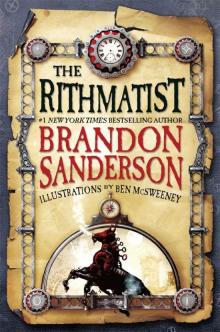 The Rithmatist
The Rithmatist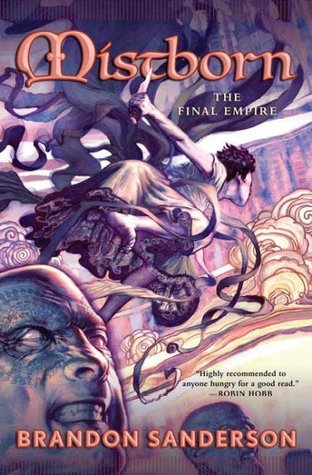 Mistborn: The Final Empire
Mistborn: The Final Empire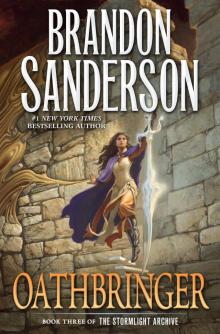 Oathbringer
Oathbringer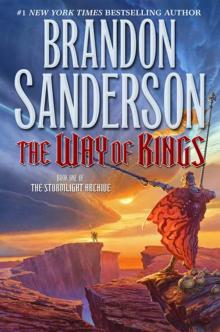 The Way of Kings
The Way of Kings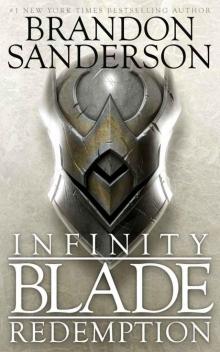 Redemption
Redemption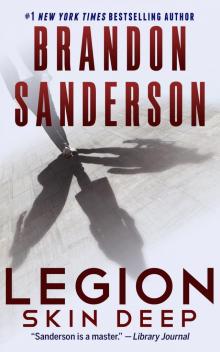 Skin Deep
Skin Deep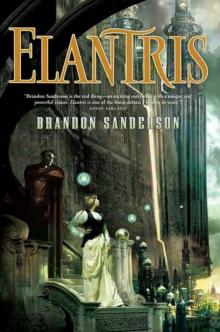 Elantris
Elantris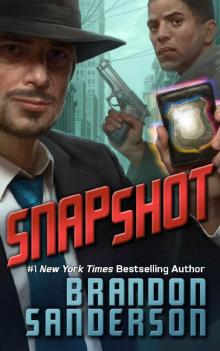 Snapshot
Snapshot Sixth of the Dusk (Cosmere)
Sixth of the Dusk (Cosmere)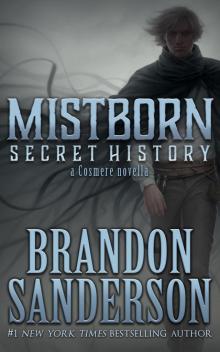 Mistborn: Secret History
Mistborn: Secret History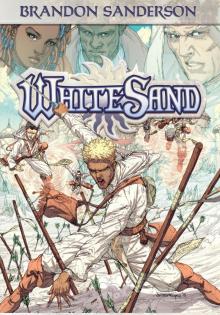 White Sand, Volume 1
White Sand, Volume 1 Legion
Legion The Well of Ascension
The Well of Ascension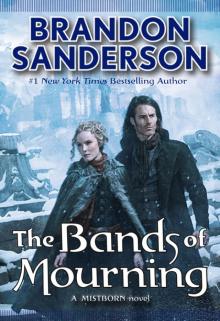 The Bands of Mourning
The Bands of Mourning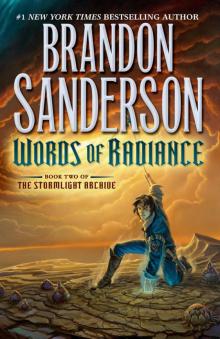 Words of Radiance
Words of Radiance The Hero of Ages
The Hero of Ages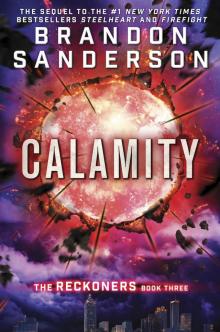 Calamity
Calamity Alcatraz Versus the Scrivener's Bones
Alcatraz Versus the Scrivener's Bones The Alloy of Law
The Alloy of Law The Emperors Soul
The Emperors Soul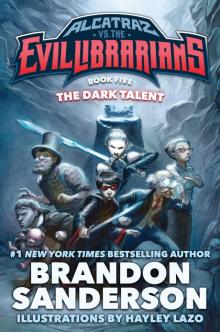 The Dark Talent
The Dark Talent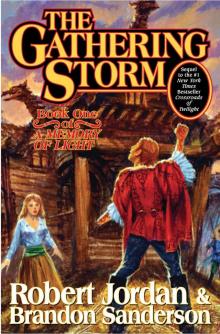 The Gathering Storm
The Gathering Storm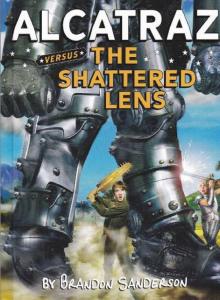 Alcatraz Versus the Shattered Lens
Alcatraz Versus the Shattered Lens Mitosis
Mitosis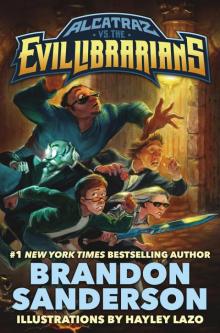 Alcatraz vs. The Evil Librarians
Alcatraz vs. The Evil Librarians Rhythm of War (9781429952040)
Rhythm of War (9781429952040)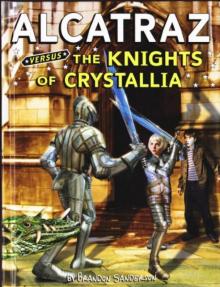 Alcatraz Versus the Knights of Crystallia
Alcatraz Versus the Knights of Crystallia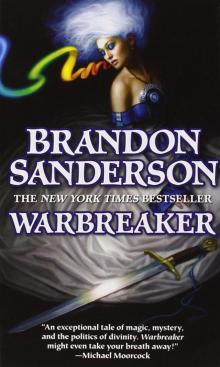 Warbreaker
Warbreaker Firstborn
Firstborn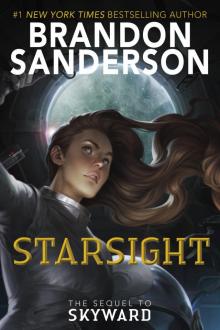 Starsight
Starsight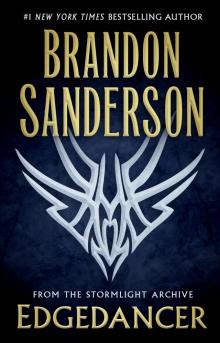 Edgedancer
Edgedancer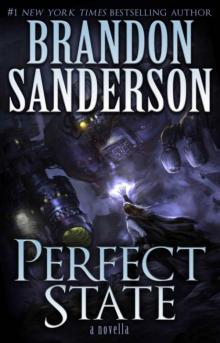 Perfect State
Perfect State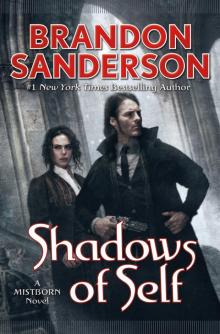 Shadows of Self
Shadows of Self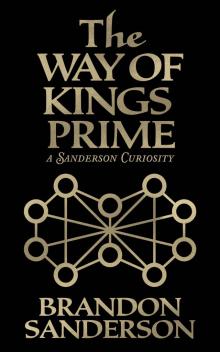 The Way of Kings Prime
The Way of Kings Prime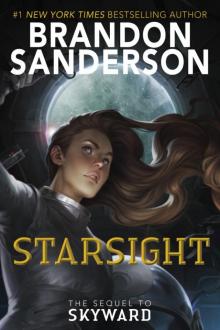 Starsight (US)
Starsight (US) Shadows for Silence in the Forests of Hell
Shadows for Silence in the Forests of Hell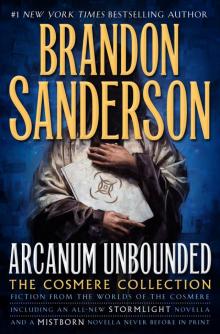 Arcanum Unbounded: The Cosmere Collection
Arcanum Unbounded: The Cosmere Collection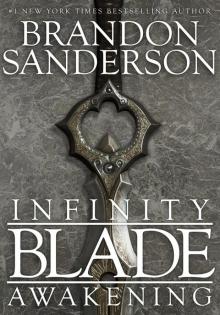 Awakening
Awakening Firefight
Firefight Dawnshard
Dawnshard Defending Elysium
Defending Elysium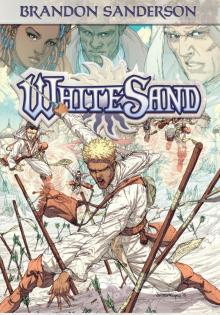 White Sand
White Sand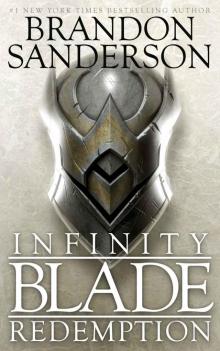 Infinity Blade: Redemption
Infinity Blade: Redemption The Final Empire
The Final Empire Skyward
Skyward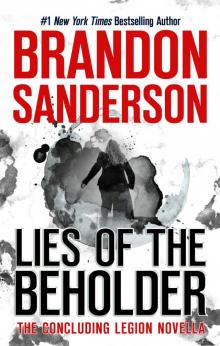 Lies of the Beholder
Lies of the Beholder Elantris e-1
Elantris e-1 Steelheart r-1
Steelheart r-1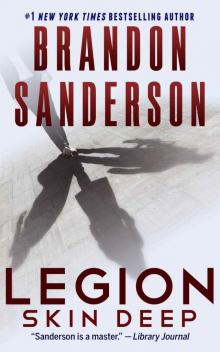 Legion: Skin Deep
Legion: Skin Deep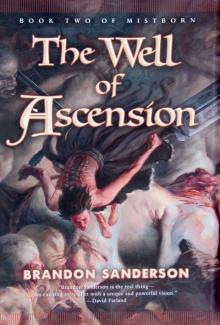 Well of Ascension
Well of Ascension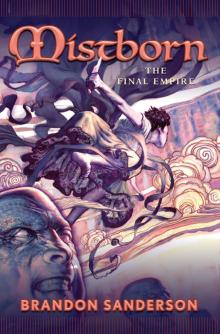 Mistborn
Mistborn Alcatraz versus the Evil Librarians
Alcatraz versus the Evil Librarians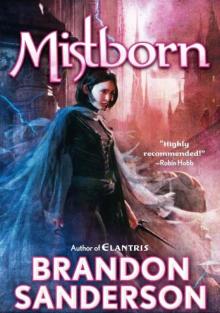 The Final Empire m-1
The Final Empire m-1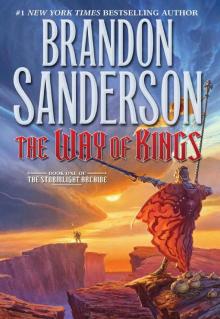 The Way of Kings (Stormlight Archive, The)
The Way of Kings (Stormlight Archive, The)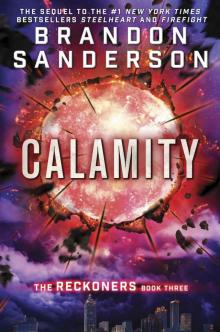 Calamity (The Reckoners)
Calamity (The Reckoners) Legion and the Emperor's Soul
Legion and the Emperor's Soul Legion: The Many Lives of Stephen Leeds
Legion: The Many Lives of Stephen Leeds The Mistborn Trilogy
The Mistborn Trilogy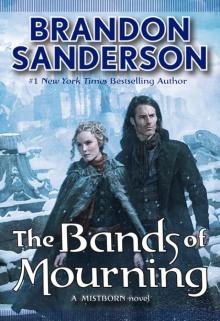 Bands of Mourning
Bands of Mourning Alcatraz
Alcatraz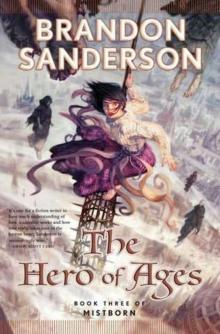 The Hero of Ages m-3
The Hero of Ages m-3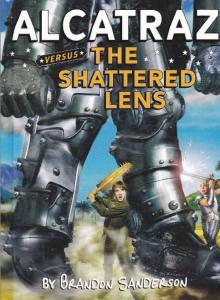 Alcatraz vs. the Shattered Lens
Alcatraz vs. the Shattered Lens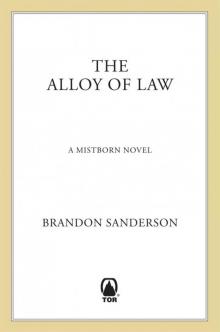 The Alloy of Law: A Mistborn Novel
The Alloy of Law: A Mistborn Novel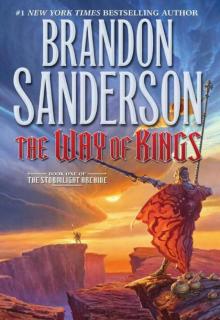 The Way of Kings sa-1
The Way of Kings sa-1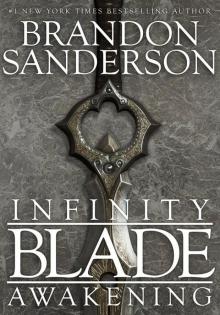 Infinity Blade: Awakening
Infinity Blade: Awakening Sixth of the Dusk
Sixth of the Dusk The Stormlight Archive
The Stormlight Archive The Aether of Night
The Aether of Night